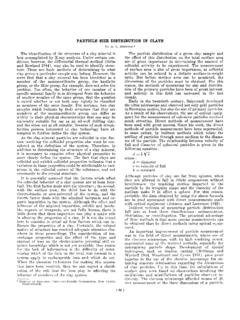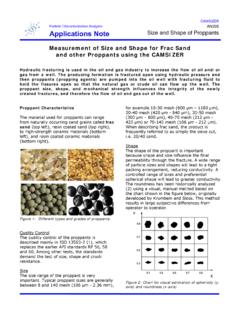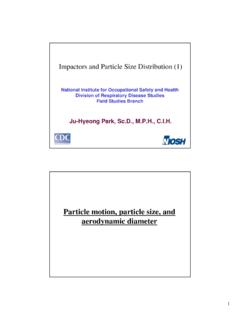Transcription of st Short Course ADVANCES IN EMULSION …
1 1 The 41st Annual Short Course & quot ; ADVANCES IN EMULSION polymerization AND latex technology & quot ; A One-Week Short Course held at the Hotel Belv d re in the Davos resort area of Switzerland August 20-24, 2018 Course DIRECTORS Dr. Mohamed S. El-Aasser Professor of Chemical & Biomolecular Engineering, Lehigh University Dr. F. Joseph Schork Professor of Chemical & Biomolecular Engineering Georgia Institute of technology Course DESIGN The Course is an in-depth study of the synthesis, characterization, and properties of high polymer latexes. The subject matter includes a balance of theory and practical problems.
2 Lectures will begin with introductory material and will progress through recent research results. Lectures will be given in English, and are held in the morning, the late afternoon, and the evening, with a large break in the afternoon to enjoy the recreational activities of the area and allow for interactions between the participants. Organized hikes and visits to points in interest in and around Davos will be arranged for some of the afternoons. PARTICIPANTS The Course is designed for engineers and scientists who are actively involved in EMULSION work, as well as for those who wish to develop expertise in the area.
3 A basic background in chemistry will be assumed. All participants will receive a set of Course notes for the lectures. 2 Course FEE The Registration Fee for the Short Course is US $1,600. The Registration Fee will cover attendance, coffee breaks, a welcome reception Sunday evening, a final reception on Thursday evening, and a set of Course notes. Payment may be made by check, wire transfer or credit card. Please contact us at for information on wire transfer or credit card payment. Course Fee is due on June 30. Refund requests received before this date will be honored in full. 3 Course SCHEDULE MONDAY, August 20, 2018 08:30 - 10:00 Kinetics of Free Radical-Initiated polymerization (F.)
4 J. Schork) 10:00 - 10:30 Coffee Break 10:30 - 12:00 EMULSION polymerization Mechanisms and Kinetics (G. W. Poehlein) 16:30 - 18:00 Semi-Continuous EMULSION polymerization and Structured Latexes (M. F. Cunningham) 20:00 - 21:45 The Role of Surfactants in EMULSION polymerization Processes and Kinetics (M. S. El-Aasser) TUESDAY, August 21, 2018 08:30 - 10:00 Engineering of EMULSION polymerization Reactors (G. W. Poehlein) 10:00 - 10:30 Coffee Break 10:30 - 12:00 Branching and Grafting in EMULSION Polymerizations (P. A. Lovell) 16:30 - 18:00 latex Rheology (C. A. Silebi) 20:00 - 21:30 Discussion of Applications and Problems Submitted by Course Participants WEDNESDAY, August 22, 2018 08:30 - 10:00 Colloidal Stabilization and Destabilization Mechanisms of latex Systems (M.
5 S. El-Aasser) 10:00 - 10:30 Coffee Break 10:30 - 12:00 A Mechanistic Study of Water Evaporation from Wet Acrylic latex Films / Glass Transition Evolution of Plasticized latex Films: An Important Process in the Application of Everyday latex Paints (J. W. Taylor) 16:30 - 18:00 Film Formation (P. A. Lovell) 20:00 - 21:45 Miniemulsions: Their latex Systems via polymerization in Submicron-Size Droplets and Direct Emulsification of Polymer Solutions (M. S. El-Aasser) THURSDAY, August 23, 2018 08:30 - 10:00 Living Radical polymerization and Recent ADVANCES in EMULSION polymerization (M.
6 F. Cunningham) 10:00 - 10:30 Coffee Break 10:30 - 12:00 Experimental Methods for the Characterization of latex Particle Size (C. A. Silebi) 16:30 - 18:00 Latexes for Industrial Applications and Methods of Reducing Residual Monomer (J. W. Taylor) 20:00 - 21:00 Discussion of Applications and Problems Submitted by Course Participants FRIDAY, August 24, 2018 08:30 - 10:00 Scale-up of EMULSION polymerization Processes (M. F. Cunningham) 10:00 - 10:30 Coffee Break 10:30 - 12:00 Sensors and Control of EMULSION polymerization Reactors (F. J. Schork) 12:00 End of Course 4 LOCATION The Course will be held at the Hotel Belv d re in Davos Platz in the Graub nden resort area of Switzerland.
7 Numerous recreational opportunities are available to both participants and their guests during the Short Course . The Steigenberger Belv d re Hotel is a five-star hotel located in the center of Davos, km from the railway station. The hotel, built in 1875, is a harmonious combination of grand past with lively present, of international standards with traditional Swiss hospitality. The view is magnificent in any season in this sumptuously appointed hotel centrally located near all of Davos many attractions and sports facilities. Spacious, comfortable rooms decorated in romantic-rustic fashion with wooden paneling or in an elegant, modern style, wish you a warm and homely welcome.
8 Large commons areas allow informal conversations between Course participants and Course lecturers outside of the formal sessions. Davos is about 100 km north of St. Moritz in southeastern Switzerland. It can be reached by air by flying into Zurich, and then taking Swiss Rail to Davos Platz, with a change of trains in Landquart. From northern Europe, the most common rail route is via Zurich and Landquart to Davos Platz. Driving to Davos should be no problem, since the roads into Davos, although mountainous, are good. HOTEL RATES Short Course room rates are: CHF 172 for standard rooms with bath (Superior room rates available from the hotel.)
9 CHF 136 supplement for a double room (second person) Rates for children are available from the hotel. Rates include a buffet breakfast, a three Course fixed-menu dinner elegantly served in the Main Dining Room with the Course participants, free WiFi and free use of the public transportation system in Davos (including selected mountain railways and cable cars). Conference rates will also apply for early arrival or extended stays. 5 LECTURE ABSTRACTS Kinetics of Free Radical-Initiated polymerization F. Joseph Schork (Georgia Institute of technology ) A review of the principles of free radical-initiated polymerization , including the basic reactions of initiation, propagation, termination and transfer; inhibition; molecular weight and molecular weight distribution, effect of temperature and pressure, auto-acceleration and diffusion control of termination and propagation, and copolymerization including copolymerization reactivity ratios and copolymer sequence distribution.
10 EMULSION polymerization Mechanisms and Kinetics Gary W. Poehlein (Georgia Institute of technology ) Reaction mechanisms and kinetics of free radical polymerization will be reviewed. The unique features of EMULSION polymerization will be outlined and the influence of the colloidal size of the reaction sites discussed. Kinetic theories due to Smith and Ewart, Stockmayer, O'Toole, Roe, Fitch, Ugelstad, and Gilbert will be discussed. Semi-Continuous EMULSION polymerization and Structured Latexes Michael Cunningham (Queens University) Semi-continuous (or semi-batch) polymerizations in which the monomer is added incrementally during the Course of reaction are commonly used in industrial processes because they allow control of the polymerization rate, and because they can be used to control the particle morphology.






